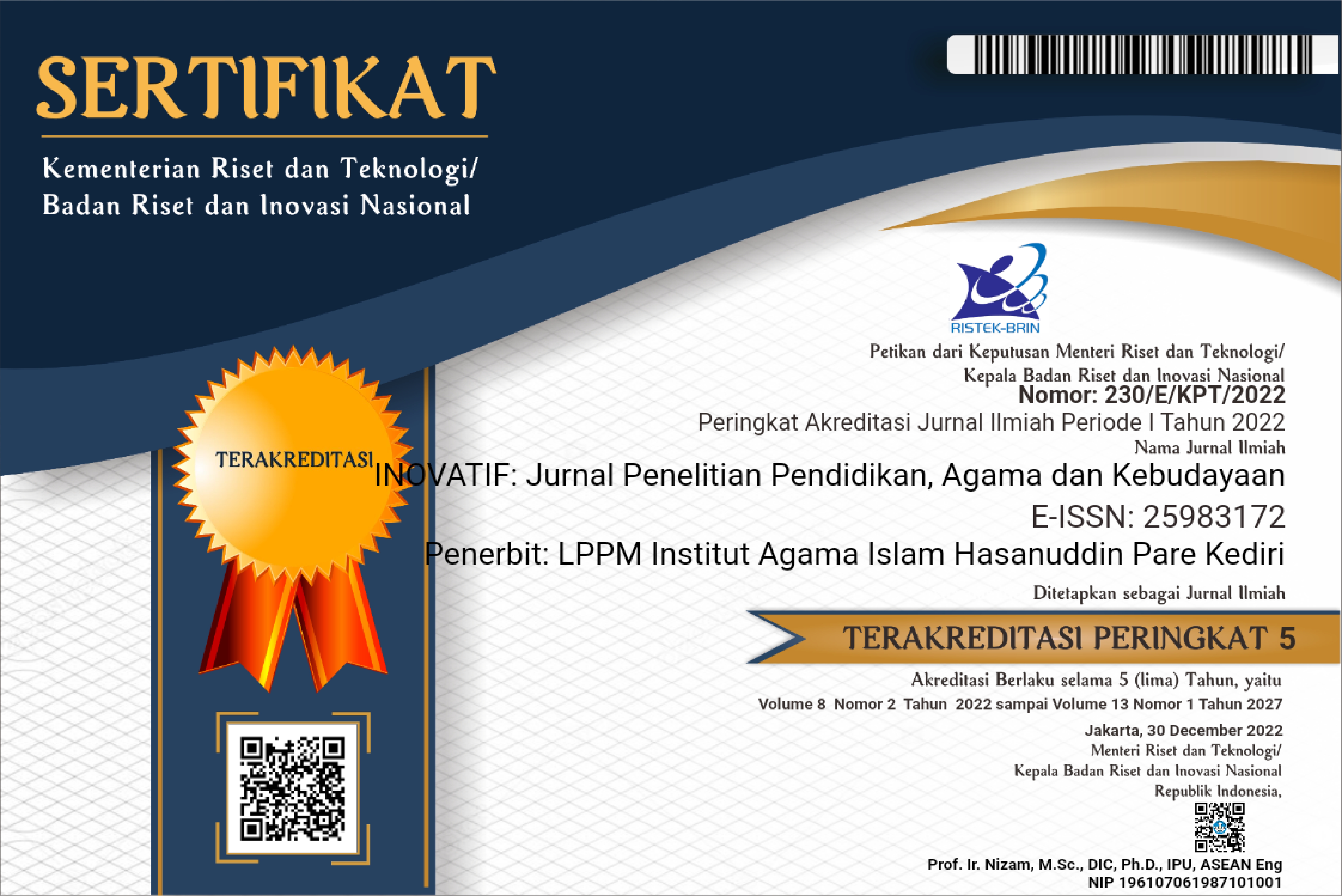Guru Ideal menurtu Imam Ghozali dan Syekh Az-Zarnuji dalam Kitab Ta'limul Muta'aliim dan Ihya' Ulumuddin serta Kritik guru saat mengajar
Abstract
This research was conducted by examining the books of Ta'limul Muta'aliim and Ihya 'Ulumuddin. The researcher discusses the ideal teacher according to Az-zarnuji and Al-Ghozali. Both were chosen because they have traditional educational thoughts but are still feasible to apply today. The main purpose of this study is to determine the ideal teacher in view of both, determine the ideal teacher standard in modern learning and criticize the teacher's condition when teaching. The initial stage of this research collected library data and literature texts related to education, especially the ideal teacher according to Az-Zarnuji and Al-Ghozali. The second stage examines the Teacher in both views and examines the historiography of the writing of the two books. The method used is descriptive qualitative method. This method is used to present the ideal teacher in the views of Az-Zarnuji and Al-Ghozali and to criticize the teacher's condition when teaching. Specific targets in this study are 1) Ideal Teacher according to Az-Zarnuji and Al-Ghozali by studying the books of Ihya 'Ulumuddin and Ta'liimul Muta'alim. 2) Identifying the factors that influence their thinking in education 3) Identifying criticisms and providing solutions related to teacher conditions while teaching. The findings include low teacher competence, Al-Ghazali and Az-Zarnuji's thinking is influenced by Sufism and Worship, The criticism that appears is that teachers do not understand the role of educators, Teaching Motivation is influenced by internal and external factors in the teacher's personality.
Downloads
References
Ahmad, Muhammad Abd al-Qadir, 1986, Ta`lim al-Muta`allim Tariq at- Ta`alum, Beirut; Mathba`ah al-Sa`adah.
Al-Fayyumi, Muhammad Ibrahim, 1982, Al-Ghazali wa ‘Alaqah al-Yaqin bi al-‘Aql, Kairo: Dar al-Fikr al-‘Araby.
Al-Ghazali, Al-Imam, 2016, Ihya’ Ulumiddin 1: Ilmu dan keyakinan. Terj. Ibnu Ibrahim Ba’adillah, Jakarta Selatan: Cet. III.
Al-Ghazali, Imam Abi Hamid, 1992, Ihya Ulumuddin, Al-Qohiroh: Darr-Syu’b, juz. 1.
Al-Syami, Shalih Ahmad, 2009, Hujjatul Islam “Imam Al-Ghazali” Terj. Mukrima Azzahra, Jakarta Selatan: Zaman, cet. 1.
As-sya’ri, Muhammad Hasyim, 1994, Adabul Alim wal Muta’aliim, Jombang: Maktabatu Turast Al-Islamy.
Az-Zarnuji, 2009, Ta’lim Mutaalim, Terj. Abdul Kadir Al-Jufri, Mutiara Ilmu, Surabaya.
Az-Zarnuji, 2019, Ta’lim Mutaalim Pentingnya adab sebelum ilmu, Terj. Abdurrahman Azzam, Surabaya: PT. Aqwam Media Profetika, cet.VII.
Fadli, Adi, 2017, Konsep Pendidikan Imam Al-Ghazali Dan Relevansinya Dalam Sistem Pendidikan Di Indonesia, Jurnal Uin Mataram, Volume X, Nomor 2, Juli – Desember.
https://www.kemdikbud.go.id/main/blog/2019/12/hasil-pisa-indonesia-2019-akses-makin-meluas-saatnya-tingkatkan-kualitas
Ichsan, Muhammad, 2016, Psikologi Pendidikan Dan Ilmu Mengajar, Jurnal Edukasi Vol 2, Nomor 1, Januari.
James H. Stronge, 2013, Qualities of effective teachers, trans. oleh Ellys Tjo, 2nd ed (Alexandria, Va: Association for Supervision and Curriculum Development)
Lois Ma’luf, 1975, al-Munjid fi al-Lugah wa A’alam, Beirut: Dar al-Masyriq.
Nailul Huda, Muhammad Zamroji & Hamim, 2017, Kajian dan Analisis Ta’liim mutaaliim 2, Jombang: Santri Press.
Nata, Abuddin, 2001, Pemikiran Para Tokoh Pendidikan Islam Seri Kajian Filsafat Pendidikan Islam, Jakarta: PT Raja Grafindo Persada. Cet II.
Nata, Abudin, 2003, Metodologi studi Islam, Yogyakarta: Fajar Pustaka Baru.
Pemerintah Republik Indonesia, Undang-Undang Republik Indonesia No.14 Tahun 2005 Tentang Dosen dan Guru
Pemerintah Republik Indonesia. Undang-Undang Republik Indonesia No. 20 Tahun 2003 Tentang Sistem Pendidikan Nasional.
Reber, Arthur, 1988, Peguin Dictionary of Psychology, Ringwood Victoria: Peguin Book Australia Ltd.
Shofwan, Arif Muzayin, 2017, Metode belajar menurut Imam Zarnuji: Tela’ah Kitab Ta’lim Al-Muta’aiim, Briliant: Jurnal Riset dan Konseptual Vol. 2, No. 4 November.
Solichin, Mohammad Muchlis, 2006, Belajar dan Mengajar dalam pandangan Imam Ghazali, Jurnal Tadris Vol. 1 No.2.
Suharto, Ahmad, 2016, Ayat-Ayat perjuangan, Jakarta: YPPWP Guru Muslich.
Suparno, Paul, 1997, Filsafat Konstruktisme dalam Pendidikan, Yogyakarta: Kanisius.
Zarkasyi, Abdullah Syukri, 2011, Bekal untuk pemimpin, Cet.1, Ponorogo, Trimurti Press.
Copyright (c) 2021 Benny Mahendra

This work is licensed under a Creative Commons Attribution-NonCommercial 4.0 International License.
Please read Copyright Notice for Inovatif: Journal of Research on Religious Education and Culture





